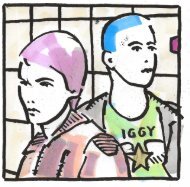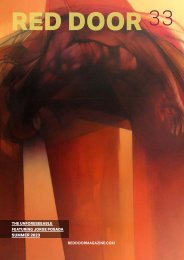Red Door Magazine 23
Visit www.reddoormagazine.com
Visit www.reddoormagazine.com
Create successful ePaper yourself
Turn your PDF publications into a flip-book with our unique Google optimized e-Paper software.
I receive the reply, “Oh, there’s not nearly enough<br />
supplies out here to wear that stuff on every call.”<br />
I decide not to voice the hundreds of responses that<br />
rushed to mind after hearing that.<br />
At the end of “Naked,” the protagonist has broken up<br />
with Little Ken and lain the groundwork to re-enter the<br />
workforce, but first she helps her friend’s daughter<br />
with an art project for school, which is back in session<br />
the next week. The protagonist becomes somewhat<br />
infantilized in the process, eventually spending the<br />
night and having a little slumber party with the daughter.<br />
The story ends with the protagonist reflecting on<br />
the prospect of rejoining the workforce, and emotion<br />
wells up within her:<br />
I held my friend’s child tight against<br />
me and began to cry. My initial<br />
tears begat more and more, until<br />
my weeping turned into wrenching<br />
sobs. I could sense that the child had<br />
woken up, startled by my outburst.<br />
Mama, mama, she’s crying! The<br />
child called out in a voice that edged<br />
into a tearfulness matching mine. I<br />
listened to the sound of her steps as<br />
she fled to her mother for rescue.<br />
Yamamoto’s great purpose throughout her collection<br />
is less to make a statement about the pressures on<br />
working women than to capture a particular feeling,<br />
one of disassociation and detachment that’s also an<br />
attachment—a clinging to drifting away that’s not<br />
quite a death drive, but rather an agonized inhabitation<br />
of a space that’s slowly growing more uninhabitable<br />
yet seems preferable to the alternatives, at least<br />
for the moment.<br />
When my father tells me about being covered in<br />
blood from a dead woman’s mouth, he’s telling me<br />
about what it means to be in the world with others. To<br />
have a body in this world is to be vulnerable, something<br />
we don’t think about in those terms until we’re<br />
forced to. It’s a complicated, contradictory set of feelings<br />
that emerges from bodies and the skinship that<br />
links them. I think about the vulnerability of the body<br />
in times of mutual isolation—when bodies are kept<br />
apart, and also when they are compelled back into<br />
contact. I think about the loss of touch, of the prospect<br />
of losing people close to me and realizing that<br />
the last time I touched them would remain the last<br />
time I’d touch them. I think about the power of skinship<br />
and the undertow of the animal self beneath all<br />
our higher functions and ambitions and compulsions.<br />
In the end, the skinship between the protagonist of<br />
“Naked” and her friend’s daughter hasthe power to<br />
draw forth the grief that’s been suppressed throughout<br />
the story, the grief over breaking her attachment<br />
to her detachment, to her distance from the ambitions<br />
and drive that used to define her. It’s also an<br />
attachment to her detachment, to her distance from<br />
the ambitions and drive that used to define her. It’s<br />
also an attachment to her child self, akin to the animal<br />
self she allowed herself to share with Little Ken until<br />
she no longer could, just like she can no longer be a<br />
child either. And this grief erupts bodily, making her<br />
vulnerable and also monstrous, scaring the child and<br />
also herself, an outpouring that stands in for the connection<br />
that can no longer be made, that separates<br />
the jagged contours of mourning from the comforts<br />
of melancholy. The power of skinship is rendered as<br />
the power of attachment itself, in its beauty and terror.<br />
The power of attachment, and the terrible power of<br />
its severance.<br />
ABOUT THE AUTHOR:<br />
Brian Bergstrom is a lecturer in the East Asian Studies<br />
Department at McGill University in Montréal. His articles<br />
and translations have appeared in publications<br />
including Granta, Aperture, Mechademia, positions:<br />
asia critique, and Japan Forum. His translation of<br />
We, the Children of Cats by Tomoyuki Hoshino (PM<br />
Press) was longlisted for the 2013 Best Translated<br />
Book Award, and his translation of the story “See” by<br />
Erika Kobayashi won runner-up in Asymptote’s Close<br />
Approximations translated fiction contest in 2017.<br />
ISSUE # <strong>23</strong> - LANGUAGE<br />
33

















